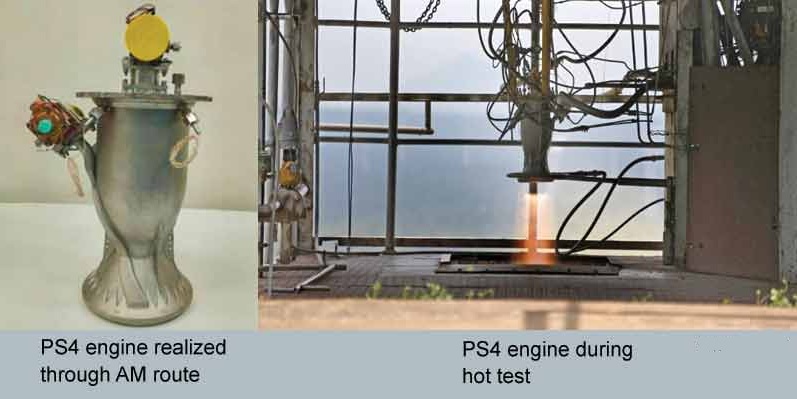ISRO Successfully Tests 3D Printed PS4 Rocket Engine

India
ISRO successfully tests a 3D-printed PS4 engine, saving 97% of raw materials and reducing production time by 60%, marking a significant leap in space technology.
In a significant leap forward, the Indian Space Research Organisation (ISRO) has successfully conducted a long-duration test of its PS4 engine, redesigned for production using cutting-edge additive manufacturing (AM) techniques, commonly known as 3D printing. This breakthrough marks a remarkable advancement in space technology and manufacturing capabilities.
The newly crafted engine, now a single piece, boasts impressive efficiency gains. ISRO reports that it saves an astonishing 97 percent of raw materials and reduces production time by 60 percent. These efficiency improvements hold promise for more cost-effective and sustainable space exploration endeavors.
The milestone was achieved through the successful hot testing of a liquid rocket engine manufactured through AM technology for a duration of 665 seconds on May 9. This engine, known as the PS4 engine, is utilized in the Polar Satellite Launch Vehicle (PSLV) upper stage, a critical component of ISRO's launch missions.
Traditionally, the PS4 engine was manufactured using conventional machining and welding methods. However, through innovative redesigning by ISRO's Liquid Propulsion Systems Centre (LPSC), it became amenable to the Design for Additive Manufacturing (DfAM) concept. The adoption of Laser Powder Bed Fusion technology allowed for the consolidation of parts, reducing the number from 14 to a single piece and eliminating 19 weld joints. This not only streamlines production but also results in significant savings in raw material usage.
The successful hot testing of the AM PS4 engine marks a culmination of rigorous development efforts, including detailed flow and thermal modeling, structural simulation, and cold flow characterization. ISRO conducted four successful developmental hot tests, followed by a full qualification test of 665 seconds, validating the engine's performance parameters.
Moreover, the manufacturing of the engine was accomplished in Indian industry, highlighting the domestic expertise and capabilities in advanced manufacturing techniques. M/s WIPRO 3D, in collaboration with ISRO, played a pivotal role in realizing this technological feat.
The induction of the AM PS4 engine into the regular PSLV program underscores its readiness for operational deployment. This signifies a significant stride towards enhancing the efficiency and reliability of ISRO's launch vehicles, ultimately contributing to India's prowess in space exploration.
In conclusion, ISRO's achievement in developing and testing the 3D printed PS4 engine heralds a new era of innovation in space technology and manufacturing. With its potential to revolutionize production processes and enhance mission capabilities, this milestone paves the way for future advancements in the realm of space exploration.


